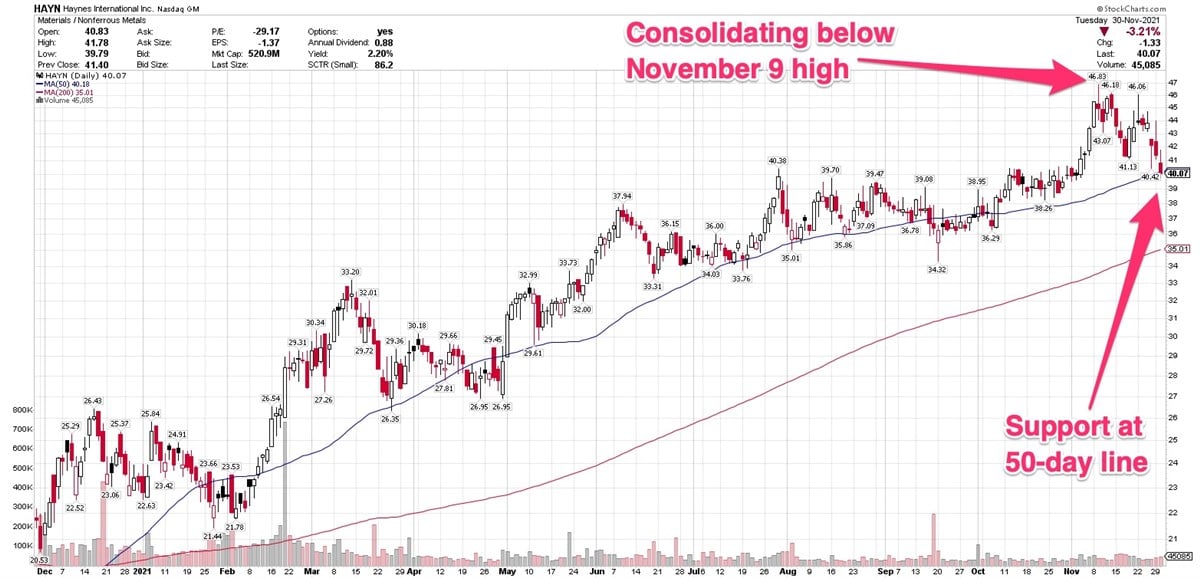Haynes International Earnings & Revenue Up After Rough 2020 Small-cap Haynes International (NASDAQ: HAYN) is finding support near its 50-day moving average after slipping from a November 9 high of $47.08. The stock is outperforming the Russell 2000 small-cap...
By Kate Stalter
This story originally appeared on MarketBeat

Small-cap Haynes International (NASDAQ: HAYN) is finding support near its 50-day moving average after slipping from a November 9 high of $47.08.
The Indiana company produces high-performance cobalt and nickel alloys in various forms, including sheet, coil, and plate. Haynes' products are deployed in numerous industrial applications, including chemical processing, aerospace, industrial gas turbine and others.
The bulk of Haynes' revenue comes from the U.S., but it also sells internationally in China, Europe and other regions.
The company, whose market cap is just $503 million, reported third-quarter results on November 18. The stock moved 4.88% higher that day, in trading volume 13% heavier than normal. It moved up in the next two sessions but slipped along with the broader market more recently.
Haynes is one of those small companies in a non-glamourous industry that doesn't get much love from the media. Because it's small, with only 11.9 million shares in float, it's not an institutional-quality stock in the way a larger company is.
Growing Fund Sponsorship
Nonetheless, it does have a decent amount of fund ownership, and that number grew in the past two quarters. The fund holding the largest stake in Haynes is the Royce Opportunity Fund, which owns 2.85% of outstanding shares.
Meanwhile, at the Cavanal Hill Opportunistic Fund, Haynes shares comprise 1.48% of fund assets. That's the largest fund allocation of Haynes shares.
Small companies like this also have scant analyst coverage. There are far more small-cap stocks than large caps, but analysts and investment banks simply don't have the resources to cover these companies, as these small stocks aren't always liquid enough for the big institutions to add.
However, there's a potential upside to this lack of attention: The investable small-cap universe is inefficient when it comes to the distribution of information. Institutional managers focusing on small stocks compete with fewer rivals and are theoretically in a better position to snap up stocks at low valuations, ahead of a run-up.
Smaller companies like Haynes often allow greater access to management teams than larger firms, helping fund managers make more informed decisions.
So how does Haynes compare to a small-cap index?
The stock is up 3.71% in the past month, 5.68% in the past three months, 77.35% year-to-date and 88.97% in the past year.
That's better than the Russell 2000 small-cap index, which is down 2.30% in the past month and down 1.41% in the past three months.
Year-to-date, the index is up 15.66%, and up 23.24% in the past year.
Because of their size and relative lack of liquidity, small caps are often more volatile than their larger peers.
Haynes has a beta of 1.06, meaning it's just slightly more volatile than the broader market. A little volatility is not a bad thing, as it can also present upside opportunities.
Bouncing Back From Rough 2020
In its recent quarterly report, the company touted recent progress as orders bounce back from slowdowns last year and in the first quarter of this year.
"Our business improvement and transformation initiatives resulted in a 17.5% gross margin and net income of $2.6 million in the fourth quarter," said president and CEO Michael Shor.
He noted that fiscal year 2021 aerospace shipments were just 50% of the pre-pandemic fiscal year 2019 levels, the company saw the first signs of meaningful growth in the aerospace market shipments and backlog in the quarter.
The company earned $0.20 per share in the most recent quarter, up from a loss of $0.46 per share a year ago. Revenue was $95.3 million, up 19%.
Analysts expect the company to earn $1.11 per share in fiscal 2022, up from a loss of $0.71 per share in fiscal 2021. That's seen rising by 87% in fiscal 2023, to $2.08 per share.
This company clearly has some potential and is rebounding from some tough quarters. For investors and traders who can handle the potential volatility of a small stock with relatively few shares in the float, Haynes could offer a buy opportunity as it approaches that previous high of $47.08.











